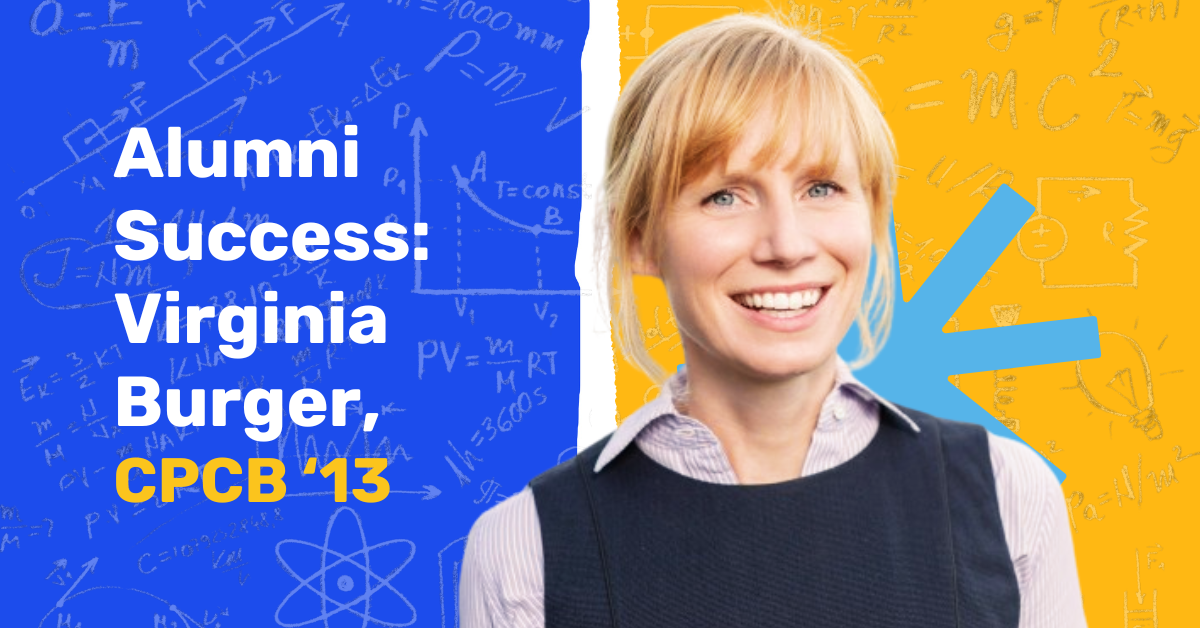Virginia Burger has found her career niche at the intersection of science and business development. The 2013 alumna of the Joint Carnegie Mellon-University of Pittsburgh PhD program in Computational Biology (CPCB) is an entrepreneur-in-residence at Blackbird Labs. Blackbird Labs is a non-profit incubator and early-stage life sciences venture investment fund that supports the formation and development of biotechnology startups in Baltimore.
Burger has always been passionate about applying math and computer science to biomedical problems. She joined the CPCB program because of its curriculum that combined computational methods with life sciences, skills she uses in her current role.
Creating Businesses that Improve Medicine
As an entrepreneur-in-residence, Burger focuses on identifying translatable technologies that could solve major biomedical challenges and then creating business plans to bring that technology to patients.
“Every day, I look for cutting-edge solutions for scientific problems to help with various medical needs,” Burger said.
One project she’s working on now is a gene therapy platform optimized for certain cell or tissue types. This will allow physicians to deliver genes to specific organs, reducing the risk of toxicity to other organs. She’s also looking at AI technologies, including in the protein design and predictive medicine spaces.
Burger helps develop business models with academics to transform their research into startups making real impact in the community. She is no stranger to the startup world, having begun her career at a startup company.
After working as a postdoctoral fellow at the Massachusetts Institute of Technology, Burger joined XtalPi, a startup focused on crystal structure prediction of small molecules. “I wanted to experience what it was like to do scientific research in an industry setting,” she said. “I liked that it was so collaborative and interdisciplinary, and you could just go to any research group and say, ‘Hey, I think this is a good idea.’”
She switched her focus from algorithms to business development after her colleagues recognized her knack for talking to pharmaceutical companies about science. Burger said the CPCB program honed these scientific thinking and communication skills.
“We spent a lot of time talking to clinicians about their computational pathology needs and meeting with different experimental labs about their data,” she said. “That was really helpful in developing this ability to speak with experts to find out what their needs are in a particular area and building solutions that work for them.”
Lessons from a Former CEO
Burger’s business acumen helped her launch her own company in 2019. She was the CEO and co-founder of New Equilibrium Biosciences, a startup focused on drug discovery for intrinsically disordered proteins, a type of protein that malfunctions in most cancers. These shape-shifting proteins do not fold into stable 3D structures, making their shapes poorly visible to experiment and adding a challenge to drug design.
The company incorporated computational biology, experimentation and machine learning. To visualize these proteins’ shapes and guide drug design, New Equilibrium built an AI model that describes quantum chemistry, which they used to simulate protein motion and predict a protein’s most stable shapes.
New Equilibrium Biosciences closed in 2023, but Burger said the experience of building her own company has shaped how she approaches her current role.
“Running a company involves a lot of big picture thinking because you have all these moving parts, including science, business development, legal and culture concerns,” she said. “Having been in a founding role, I have an idea of what resources will be helpful to other scientific founders and I know to listen to each founder because every company is different.”
The Value of a Computational Biology Degree
Reflecting on her journey, Burger credits her time at Pitt in equipping her with the tools to navigate the complex landscape of therapeutics. She advises current CPCB students to immerse themselves in both computational and wet lab aspects of biology, emphasizing the value of interdisciplinary knowledge.
“AI drug discovery companies want to hire people who have both computation and experiment in their background, and so few people do,” Burger said. “But everybody coming out of a computational biology PhD program does, and I think they’re highly sought-after employees and are only going to be more sought after as the impact of AI in drug discovery increases.”


